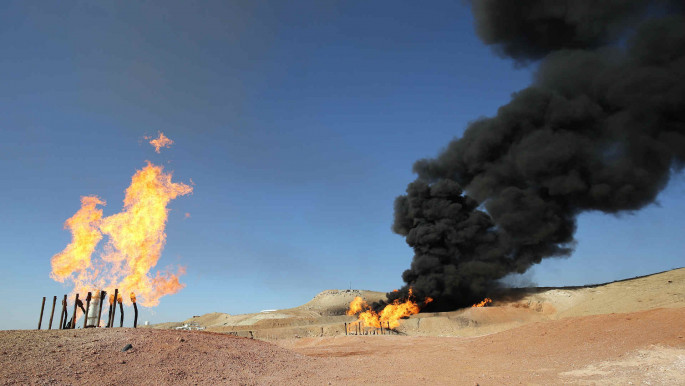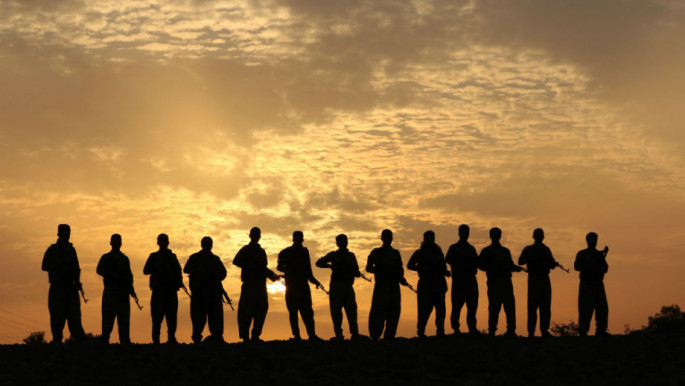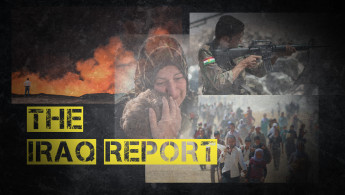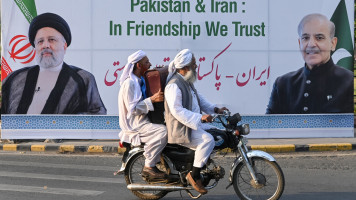The Iraq Report: Regional powers wrestle over Iraq influence
Click here to receive The Iraq Report each week in your inbox
As a sense of triumphalism takes hold in the Iraqi capital following the routing of the Kurds, Prime Minister Haider al-Abadi has begun a regional diplomatic offensive to further boost his credentials before the upcoming parliamentary elections in 2018. Feeling that he will likely face stiff opposition from other Shia Islamist politicians, Abadi appears to be attempting to balance his interests with Iran, while moving closer to traditional US allies such as Saudi Arabia.
However, it is unclear how serious Abadi is in his claims to want regional partnerships with all actors who have a hand in Iraqi affairs. Shia militants are becoming more prominent than they have ever been, and US exhortations for Iraq to distance itself from Iranian influence have not only fallen on deaf ears, but have been openly criticised by Baghdad. In light of the utter collapse of the Kurdish position over the past fortnight, US credibility in Iraq has fallen even further into question.
Saudi Arabia and US aim to undermine Iran in Iraq
Following the Saudi Arabian initiative to build closer ties with its estranged Shia-led Iraqi neighbour throughout the summer, King Salman bin Abdulaziz al-Saud invited Prime Minister Abadi to visit the Saudi capital, Riyadh, to begin work on the two countries’ “coordinating council”.
Abadi landed in Saudi Arabia as relations between the two countries continue to warm. Not only did Riyadh open its northern land border with Iraq earlier this year, but Saudi Arabia’s budget airline Flynas also restarted flights to Baghdad last Wednesday for the first time in 27 years, after relations broke down with former Iraqi leader Saddam Hussein.
Flynas was joined by national carrier Saudia a day later, in a move widely interpreted as an attempt to facilitate Saudi investment, trade and diplomatic engagement with Iraq in order to wean Iraqis from Iranian influence.
Abadi landed in Riyadh on Saturday, alongside US Secretary of State Rex Tillerson. The presence of Washington’s top diplomat was a clear indication that Riyadh’s moves towards bringing Baghdad back into the Arab fold came with Washington’s blessings, perhaps even at its urging.
By creating an alliance and strategic partnership between Iraq and Saudi Arabia, the United States is seeking to shut the doors of the Arab world to Iranian influence, whereby Tehran uses Iraq as a transitory hub into Syria and recruitment ground for Shia militants. Iran also reaps massive economic benefits by flooding Iraqi markets with its goods, and its influence over key political actors and major Shia militant groups who control ministries ensure Iran has a monopoly over Iraqi affairs.
Both Saudi Arabia and Iraq are suffering economically, partly due to a slump in oil prices. A strategic partnership between the two countries who occupy enviable positions as two of the world’s largest oil exporters is viewed as a potential opportunity to boost a faltering Saudi economy. With other OPEC countries on board, Riyadh could potentially manoeuvre for a reduction in oil production, thereby increasing prices. From Riyadh’s perspective, if this also comes at the cost of reducing Iranian influence in Iraq, then so much the better.
 |
| When Iraqi troops took control of oil-rich areas such as the Havana field west of Kirkuk, chances of a Kurdish state went up in smoke [AFP] |
US rebuffed by Baghdad over Iran
However, it is doubtful that Abadi will want to risk his relations with Iran, who already control so much of his country and who can destabilise his rule significantly - to the point where he would be forced from office.
In remarks made to the press in Riyadh on Sunday, Tillerson said that it was time for Iranian militias in Iraq to “go home”. According to the US diplomat, now that the fighting against the Islamic State group has largely been concluded, there is no need for the presence of Iranian militias in Iraq - and their presence was destabilising.
Tillerson’s comments come in the wake of US President Donald Trump’s announcement almost two weeks ago of a new aggressive strategy to curb Iranian power in the region, including by designating Iran’s Islamic Revolutionary Guard Corps a terrorist organisation, and authorising the imposition of sanctions on it and its affiliated organisations.
Considering the IRGC and its elite “Quds Force” led by Major-General Qassem Soleimani is actively involved with the Badr Organisation, Asa’ib Ahl ul-Haq, and other notorious Shia Islamist militant groups in Iraq, the potential scope of these sanctions could be quite severe and could even hit the Badr-controlled Iraqi interior ministry.
However, Tillerson’s remarks were openly rebuffed by the Iraqi prime minister’s office on Monday, which characterised the US position as an attempt to “meddle in Iraqi matters”. This demonstrates just how far Washington’s influence has slid in Iraq, going from being the country that established Abadi and his predecessors as rulers of Iraq, to being the country that lost the battle for influence to Iran.
Shia Islamist militants remain dominant
There are other concerns regarding Washington’s position in Iraq that have caused many to denounce Trump’s new strategy against Iran as “incoherent”. Not only are most of the Iran-backed militants Iraqis themselves, and therefore they are already technically home, Iraqi ministries are literally controlled by these groups. The US government has supplied these ministries with funding, as well as advanced weapons, including M1 Abrams tanks, that were used by the Iranian proxies the US is now denouncing.
When Shia militants rolled into Kirkuk just over a week ago, they did so using American-made Humvees and M1 tanks, some of the most advanced military equipment in the world. Their access to this equipment could only have come from the defence and interior ministries, with especially the latter being involved in Iranian activity and alleged sectarian cleansing campaigns that began not long after the invasion in 2003. It is therefore arguable that there is no way that the US government was unaware of their links to Tehran.
That same advanced military equipment was fielded again by Shia militants, alongside the regular Iraqi army, as they clashed with Kurds at Altun Kompri and drove them out on Friday, leaving the entirety of Kirkuk province back under federal control. The assault on Altun Kompri was coordinated between Shia militants in the Popular Mobilisation Forces, the US-trained and equipped Counter Terrorism Service, and the interior ministry’s Federal Police.
Read more: Behind the story: On the Kurdish frontlines at Altun Kompri
With the majority of these units staffed by men with close ties to Iran-backed militant groups who have now become embedded into the modern Iraqi state, the United States will struggle to apply sanctions without undermining the Iraqi state in which it has invested so much time, capital and blood. If they did, the US would be admitting defeat in the Iraqi venture it began in 2003.
 |
| Peshmerga fighters pictured at Koya, near Erbil [AFP] |
Kurds buffeted by rivalry and chaos
With Shia militants and pro-Baghdad forces now at Altun Kompri with increasing numbers of artillery, tanks and men building up at the administrative border of the Kurdistan Region, the Kurdish leadership is left facing a hostile force a few dozen kilometres south of their capital, Erbil.
This has led to Kurdish opposition group Gorran calling on Kurdistan Democratic Party leader and KRG President Masoud Barzani to resign, along with his deputy from the rival Patriotic Union of Kurdistan, Kosrat Rasul Ali.
Shoresh Hajji of the Gorran Movement, which holds 24 out of 111 seats in the Iraqi Kurdish parliament, said on Sunday: “The Kurdistan Region’s president and his deputy no longer have any legitimacy and should resign.”
Hajji’s comments come after Iraqi Kurds voted overwhelmingly on 25 September to secede from Iraq, a bid that backfired spectacularly as all the territorial gains taken by the Kurds were snatched from them in a lightning campaign by the Iraqi government and Iranian-sponsored militias.
This was followed by Baghdad issuing an arrest warrant against Kosrat Rasul for allegedly inciting against federal authority, and Erbil issuing arrest warrants against 11 high-profile Shia militant leaders, including Qais al-Khaz’ali.
In further signs that the Kurdish leadership are being forced into a climbdown from their previous position on independence, the KRG announced late on Tuesday night that they were ordering a “freeze in the results of the referendum… [and to] begin dialogue between Baghdad and Erbil”. According to the KRG, this was in order to “avoid further violence and clashes between Iraqi and Peshmerga forces”.
The rapid collapse of the Kurdish position – in part due to pro-Iran factions within the PUK – led the KRG to announce that presidential elections slated for 1 November would be cancelled, citing an alleged lack of candidates from the parties.
Barzani has been president of the KRG since 2005. His term expired in 2015, but has been extended for several years - leading to accusations that he is ruling Iraqi Kurdistan as a dictator and not through democracy.
Click here to receive The Iraq Report each week in your inbox
Follow us on Twitter: @The_NewArab



